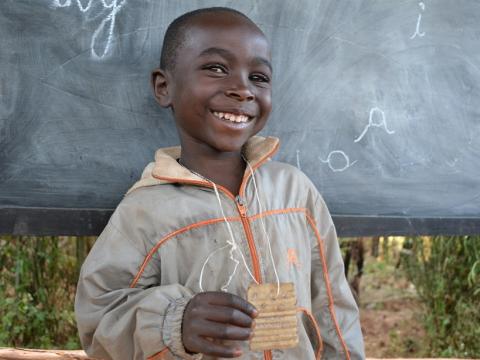Clovis now lives in a literacy rich environment in Burundi

Clovis is a five-year-old boy living in the northeast of Burundi. He frequently carries a piece of cardboard around his neck, on which are written vowels in his mother tongue. Though he hasn’t started primary school, he already knows how to read and write those vowels.
Burundi has one of the highest rates of illiteracy in the world, with just 67 per cent of its population able to read and write. One of the reasons for this is the lack of materials to read in the languages people speak.
World Vision recently launched the Literacy Boost[1] programme to help children in rural areas, along with vulnerable families, to learn how to read and write. Literacy Boost’s community action component includes activities, such as parental awareness training, which enable children from poor families to have access to reading materials. Training teachers and parents to create materials from locally available materials is another component of the programme.
Clovis proudly displays his cardboard necklace that helps community members teach him his vowels. (Photo credit: Achel Bayisenge / World Vision)
“We encourage parents to use any available material in their homes that can help children be exposed to writings,” says Anesie Nindorera, a 25-year-old young Literacy Boost volunteer.
Before she was trained, she did not know that it was possible to create a literacy rich environment. Anesie learned, and now teaches others, that anything can do: a door, window, walls and even plant leaves can be used to help children practice reading and writing.
“It’s all about creativity,” says Anesie. “Anything available which can help make writings visible will do.”
After their training, local volunteers created reading materials that children can move around with. A piece of cardboard material helps children whose parents can’t read and write to be supported by any community member who meets them with the cardboard. The cardboard comes from boxes that are no longer used and would have been thrown away otherwise. “It’s all about creativity,” says Anesie. “Anything available which can help make writings visible will do.”
Clovis’ parents cannot read or write, and can’t support his learning. Knowing this, a volunteer created the vowel card that Clovis now wears around his neck so that anyone he meets in his village can help him read.
“Ndayishimiye [a neighbour] teaches me,” Clovis says.
“I am very happy to see that we are making an impact using modest means,” says Venuste Nitereka, Literacy Team Leader.
Even when Burundian parents know how to read and write, their daily activities – farming the land, providing for families and coming back home when it is dark in areas without electricity – prevent them from doing it, Anesie explains.
Anesie feels that Literacy Boost has attained its goal to get everyone involved in helping children know how to read and write. Venuste Nitereka, World Vision Burundi’s Literacy Team Leader agrees.
“I am very happy to see that we are making an impact using modest means,” says Venuste.
Related links:
- VIDEO: Strengthening children's literacy skills in Burundi
- Community literacy education in Burundi helps a grandmother teach her granddaughter to read
- Addisu moves from 'not knowing to knowing' at a Literacy Boost reading club
[1] Literacy Boost is a copyrighted tool designed, developed, and owned by Save the Children.